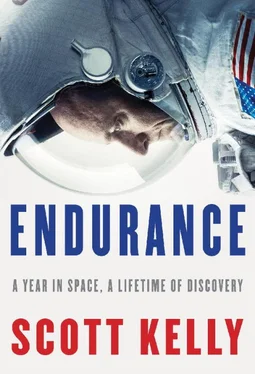“Fucking blya, ” Gennady groans. Fucking bullshit.
Still no indication the docking probe has deployed. This could be a problem.
The process of docking two spacecraft together has remained pretty much unchanged from the Gemini days: one spacecraft sticks out a probe (in this case, us), inserts it into a receptacle called a drogue in the other spacecraft (the ISS), a connection is made, everyone cracks sex jokes, we leak-check the interface before opening the hatch and greeting our new crewmates. The process has been reliable for the past fifty years, but this time the probe doesn’t appear to have worked.
The three of us give one another a look, an international I-can’t-fucking-believe-this look. Soon, ISS will be looming in the window, its eight solar array wings glinting in the sun like the legs of a giant insect. But without the docking probe, we won’t be able to connect to it and climb aboard. We’ll have to return to Earth. Depending on when the next Soyuz will be ready, we might have to wait weeks or months. We could miss our chance altogether.
We contemplate the prospect of coming back to Earth, how ridiculous we’ll feel climbing out of this capsule, saying hello again to people we’ve just said the biggest good-bye in the world to. Comm with the ground is intermittent, so they can’t help us much in our efforts to figure out what’s going on. I turn to see Misha’s face. He is shaking his head in disappointment.
Once Gennady and Misha transition the computer software to a new mode, we see that the probe is in fact deployed. It was just a software “funny.”
All three of us sigh with relief. This day hasn’t been for nothing. We are still going to the space station.
I watch the fuzzy black-and-white image on our display as the docking port on ISS inches closer and closer. I wonder if it’s true that the probe is actually okay. The last part of the rendezvous is exciting, much more dynamic than the space shuttle docking ever was. The shuttle had to be docked manually, so it was a slow ballet with little room for error. But the Soyuz normally docks with ISS automatically, and in the last minutes of the approach it whips itself around quickly to do an adjustment burn. Even though we’d known to expect this, it’s still attention getting, and I watch out the window as the station comes flying into view, its brilliant metal sparkling in the sunlight as if it’s on fire. The engines fire briefly, and we hear and feel the acceleration. Leftover fuel vents outside, glinting in the sun. With the burn complete, we snap back into position to move toward the docking port.
When we finally make contact with the station, we hear and feel the eerie sound of the probe hitting, then scratching its way into the drogue, a grinding metal-on-metal sound that ends with a satisfying clunk. Now both ISS and the Soyuz are commanded to free drift—they are no longer controlling their attitude and are rotating freely in space until a more solid connection can be made. The probe is retracted to draw the two vehicles closer together, then hooks are driven through the docking port to reinforce the connection. We’ve made it. We slap one another on the arms.
I join Gennady in the orbital module, where we struggle out of the Sokol suits we put on nearly ten hours earlier. We are tired and sweaty but excited to be attached to our new home. I take off the diaper I’ve been wearing since I left Earth and put it in a Russian wet trash bag for later disposal on the ISS. I get into the blue flight suit I call my Captain America suit because of the huge American flag emblazoned across the front. I hate these flight suits—the Russian who has been making them for years can’t be made to understand that we stretch an inch or two in space, so within a few weeks I will no longer be able to wear the Captain America suit without having my balls crushed.
As eager as we are to greet our new crewmates, we need to make sure the seal between the Soyuz and ISS is good. The leak checks take nearly two hours. The space between the two docking compartments has to be filled with air, which we then test to determine whether its pressure is dropping. If it is, we don’t have a good seal, and opening the hatch will cause ISS and Soyuz to lose their atmosphere. Occasionally, as we wait, we hear the crew on the other side banging on the hatch in a friendly greeting. We bang back.
The leak check finally complete, Gennady opens the hatch on our side. Anton Shkaplerov, the only cosmonaut on board the ISS, opens the Russian hatch on their side. I smell something strangely familiar and unmistakable, a strong burned metal smell, like the smell of sparklers on the Fourth of July. Objects that have been exposed to the vacuum of space have this unique smell on them, like the smell of welding—the smell of space.
There are three people up here already: the commander and the only other American, Terry Virts (forty-seven); Anton (forty-three); and an Italian astronaut representing the European Space Agency, Samantha Cristoforetti (thirty-seven). I know them all, some much better than others. Soon, we will all know one another much better. I’ve known Terry since he was selected as an astronaut in 2000, though we haven’t overlapped much in our work. Anton and Samantha I’ve only gotten to know well since we’ve been preparing for this mission over the last year. The last time I hung out with Anton was in Houston, before my last flight. We both got pretty drunk at my neighborhood bar, Boondoggles, and later ended up spending the night at a friend’s house nearby since neither of us was in shape to drive.
Over the course of this year in space, Misha and I will see a total of thirteen other people come and go. In June, a Soyuz will leave with Terry, Samantha, and Anton, to be replaced by a new crew of three in July. In September, three more will join us, bringing our total to nine—an unusual number—for just ten days. Then, in December, three will leave, to be replaced a few days later. Misha and I hope that the change in crew members will help break up the mission and the monotony to make our year less challenging.
Unlike the early days of spaceflight, when piloting skill was what mattered, twenty-first-century astronauts are chosen for our ability to perform a lot of different jobs and to get along well with others, especially in stressful and cramped circumstances for long periods of time. Each of my crewmates is not only a close coworker in an array of different high-intensity jobs but also a roommate and a surrogate for all humanity.
Gennady floats through the hatch first and hugs Anton. These greetings are always jubilant—we know exactly who we’re going to see when we open the hatch, but still it’s somehow startling to launch off the Earth, travel to space, and find friends already living up here. The big hugs and big smiles you see if you watch the hatch opening live on NASA TV are completely sincere. As Gennady and Anton say their hellos, Misha and I are waiting our turns. We know that many people on the ground are watching, including our families. There is a live feed playing for everyone at Baikonur, as well as in mission control in Houston and online. The video signal is bounced off a satellite and then down to Earth, as with all of our communications. Suddenly I get an idea and turn to Misha.
“Let’s go through together,” I suggest. “As a show of solidarity.”
“Good idea, my brother. We are in this together.”
It’s a bit awkward floating through the small hatch together, but the gesture gets a big smile from everyone on the other side. Once we’re through, I shake hands with Anton.
Next I give Terry Virts a hug, then Samantha Cristoforetti. She is the first Italian woman to fly in space, and soon she’ll be the record holder for the longest single spaceflight by a woman.
Читать дальше












